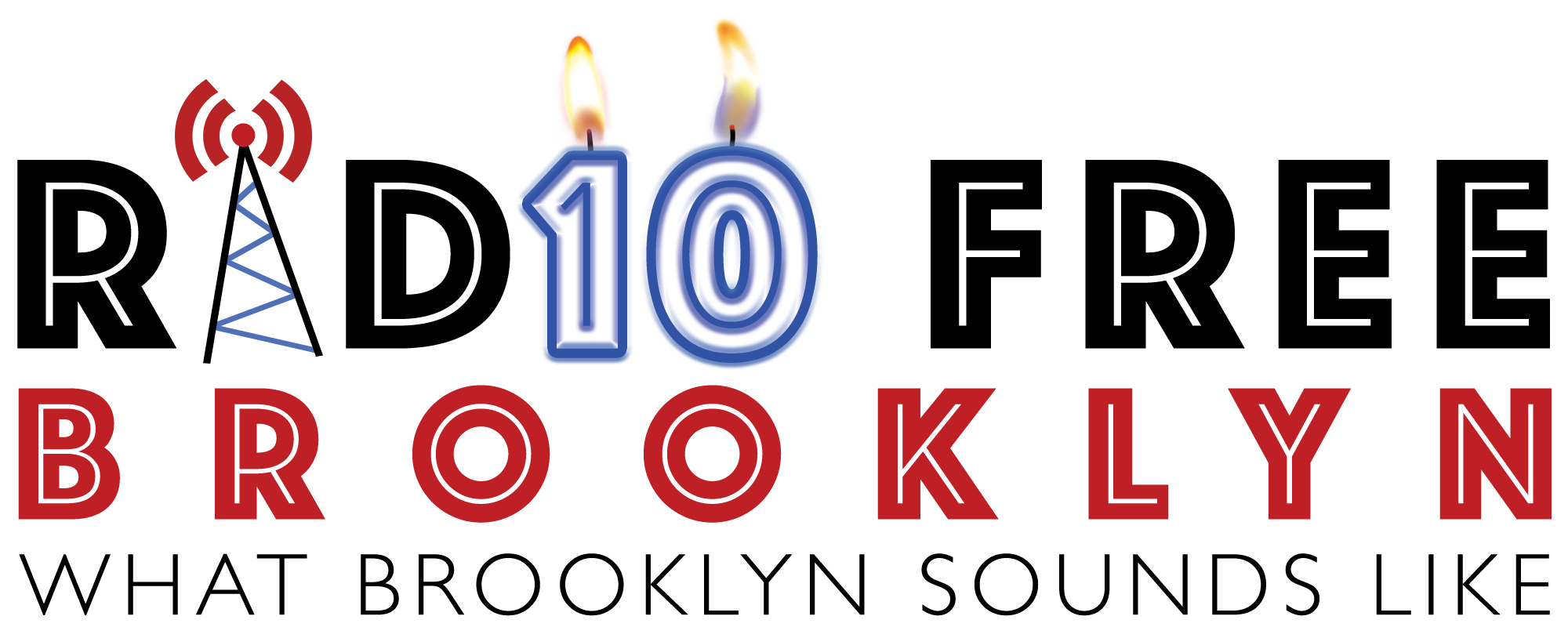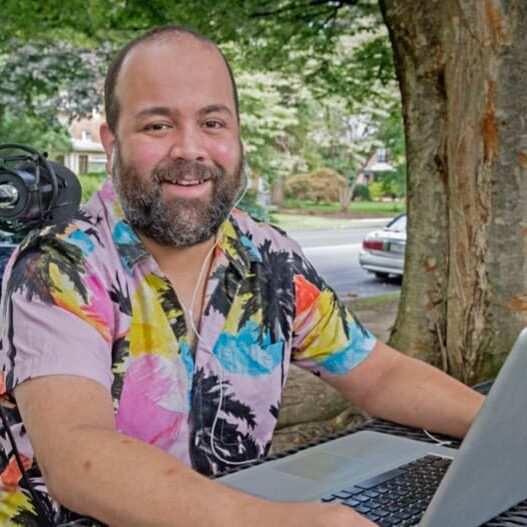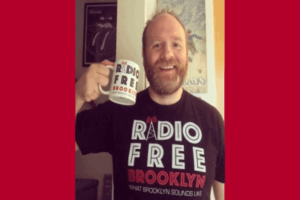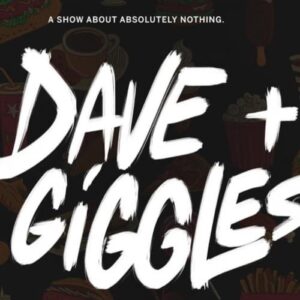RFB: Hey Christian, so glad to have you aboard! Tell us a little bit about the creative (or other) path(s) that led to you doing your show.
CC: For as long as I can remember, I’ve been a fan (and student) of broadcasting. My father was a high school art teacher, so before I started going to school, I spent most days with my mom, who loved daytime TV. Back in the ‘90s, a huge part of daytime cable was comprised of old game show reruns, and I grew up idolizing the hosts of the ‘70s and ‘80s — how they dressed, how they talked, their ability to coax fun and interesting moments from ordinary people. That admiration has stayed with me throughout my life. My lifelong dream has always been to be a game show host, but I just wanted to be a broadcaster, period. When I was a teenager, my dad and I actually became certified producers at the local public access station in Connecticut (where I’m originally from), where we did an art instructional show for a few years. Then, in college, I joined the campus radio station and eventually became the general manager — I had a studio at my disposal and was able to go on the air anytime I wanted — it was a dream come true. Later in life, I worked the front desks of some of the best hotels in central Pennsylvania. One of the skills I developed, maybe even without knowing it, was the ability to make a friend anywhere I went. But although I was meeting people from all over the world, I craved more of a connection with those people than just, “Welcome, here are your keys, room 401 is on the left.” That’s what initially got me thinking about making Stranger Than Christian, and turn the act of making friends into a weekly series.
RFB: Why did you choose RFB?
CC: I’ve always admired independent media. There’s something so liberating about being able to make what you want, as opposed to what Corporate Whoever wants. And with RFB, I sensed the possibility that I could make the kind of show that I wanted to make, and that it would be well received.
RFB: Stranger Than Christian is totally unscripted… that is like doing trapeze without a net! How do you get to the point of belief that everything will work out?
 CC: Well, when I first started doing the show, I really wasn’t sure if the concept would work the way it did in my head. I feel like nothing ever plays out exactly the way you imagine it will. But deep down, I had a gut feeling that it would work. I remember watching David Letterman interview Jerry Seinfeld about Comedians in Cars Getting Coffee. Letterman asked if the show would work with people who weren’t comedians, and Seinfeld sort of flatly replied, “No. You need jokes.” I think I took that as a personal challenge. I’m as open about myself as I hope my guests are with me. My trust in that process, along with my natural ability to actively listen and ask questions on the fly, helps me feel confident that each conversation will go well. It plays off of something I learned in my five years of working in hospitality, which is that people just want to be listened to at the end of the day. They want to feel validated, welcomed, accepted, acknowledged. I think Stranger Than Christian takes that core principle and applies it to everyday conversation.
CC: Well, when I first started doing the show, I really wasn’t sure if the concept would work the way it did in my head. I feel like nothing ever plays out exactly the way you imagine it will. But deep down, I had a gut feeling that it would work. I remember watching David Letterman interview Jerry Seinfeld about Comedians in Cars Getting Coffee. Letterman asked if the show would work with people who weren’t comedians, and Seinfeld sort of flatly replied, “No. You need jokes.” I think I took that as a personal challenge. I’m as open about myself as I hope my guests are with me. My trust in that process, along with my natural ability to actively listen and ask questions on the fly, helps me feel confident that each conversation will go well. It plays off of something I learned in my five years of working in hospitality, which is that people just want to be listened to at the end of the day. They want to feel validated, welcomed, accepted, acknowledged. I think Stranger Than Christian takes that core principle and applies it to everyday conversation.
RFB: You spoken of your love of game shows and it seems you’ve been a contestant on several. What was that like?
CC: Yes! When I turned 18, I applied to be a contestant on every game show I could get my hands on. My first experience was in 2007, as one of Bob Barker’s last contestants on The Price Is Right before his retirement. I actually waited in line in California for three days to get into that show. Two years after that, during my freshman year of college, I won on Who Wants to Be a Millionaire. In 2012, I took the woman who later became my wife on our first date using money I had won on MTV2’s Hollywood Squares. Then in 2013, I was a contestant on GSN’s The Chase, which I believe is on Netflix now. Most recently, I won $5,000 on ABC’s Match Game with Alec Baldwin. It’s certainly been a ride.
RFB: The COVID-19 pandemic continues, but that hasn’t stopped you from debuting a show! Tell us about the challenges and rewards of your process so far.
CC: Pennsylvania’s stay-at-home order was in place from March to about the beginning of June. I got laid off from my job during that time, so I saw that as an opportunity to become the broadcaster I’d always wanted to be. I spent like $50 on Amazon, bought some soundproof foam and lined my closet with it. That became my studio, and it got hot as hell during the summer, but it was so worth it. Creating a podcast was the most rewarding part of staying home. By talking to people from all over the world, I was able to combat the isolation so many people were feeling, and I was able to do so in a way that fulfilled my creative vision on my own terms — which made my heart very happy.
RFB: What is the takeaway you hope people get from Stranger Than Christian?
CC: I want listeners to take whatever they want (or need) from the show. If it helps you feel less alone in the world, that’s fantastic. If it keeps you company on long drives or helps you sleep, I love it. The conversations I’ve had have inspired me, made me sad, made me laugh, fascinated me — and softened my outlook on the world. If I can create those feelings in another person through this project, I’m golden.
Tune in to Stranger than Christian, Mondays at 2:00 am.




